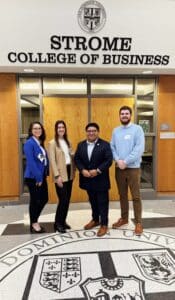UNC MPA Students Compete in (and Win!) the 2024 NASPAA Student Simulation Challenge
In early March 2024, the UNC MPA program sponsored four current students to participate in the annual NASPAA Student Simulation Challenge. The Challenge invites NASPAA-affiliated program students to participate on teams from other NASPAA-accredited schools in a competition with a cash prize to help solve a particular public sector challenge. This year’s topic was on ‘humanitarian aid and refugee asylum programs’. Paired with other students from Villanova University and Georgia Southern University, UNC MPA students Ben King, Angel Padilla, Lorenzo Pedro, and their teammates won the 2024 NASPAA Simulation Challenge.

UNC MPA Students from left: Angel Padilla, Allie Omens, Lorenzo Pedro, Ben King
Teams were tasked with serving leaders of countries confronted with the sudden arrival of refugees fleeing a war zone. They had to decide which policies to implement to get the best results for their country’s economy, stability, and international reputation. Some policy choices focused on border control, housing, and education, and decisions had to be made while staying within a strict budget. The students also negotiated a regional response, allocated limited resources, and weighed short-terms costs against long-term benefits.
Competition participant Allie Omens, an online UNC MPA student living in Nashville, TN and working for Metro Nashville Waste Services leading outreach efforts, said the experience left her better equipped to navigate tough decisions as a public administrator.
“In our post-simulation debrief with Competition staff, one thing we discussed was the idea of ‘selective equity’. At the start of the simulation, most countries embraced generous aid packages and relaxed asylum policies. But as the simulation went on, the necessity to manage our budgets compelled many of us to scale back assistance. This led to the difficult task of deciding which refugees merited our country’s assistance, creating a genuine moral dilemma. As people striving to be equitable public administrators in real life, facing these simulated choices compelled us to face the discomfort of complex humanitarian crises and other wicked problems.”
As in real-life public sector roles, the students had competing interests and goals as assigned before the competition. The challenge is similar in many other workplaces—how to balance multiple priorities within the group while putting together a collaborative plan to reach a shared goal.
Lorenzo Pedro, another online UNC MPA student from Morganton, NC works as a Legislative Liaison for the North Carolina Department of Transportation and intends to use the MPA degree to better inform himself on collaboration between governments and nonprofit organizations.
He found the competition to be stimulating practice and preparation for a real public sector situation. “Each round offered valuable insights into impactful proposals concerning the immigrants we were helping and our citizens. We also recognized the unpredictable nature of policy implementation, stressing the need for adaptability and flexibility in our approach.”
Each year, the UNC MPA program sponsors students to participate in this theory to practice professional development opportunity.
Looking back on the experience, participant Ben King reflected that “my biggest takeaway from the event was the ability to connect with other students interested in public service from across the country. Everyone was super nice, and we were able to make some good friends who we will still keep in contact with.”
Angel Padilla, another participant in the simulation, summed it up succinctly.
“Through this opportunity, I gained experience making critical decisions under strict time constraints, applied budget management skills through frequently changing costs, and improved my debating skills.”
